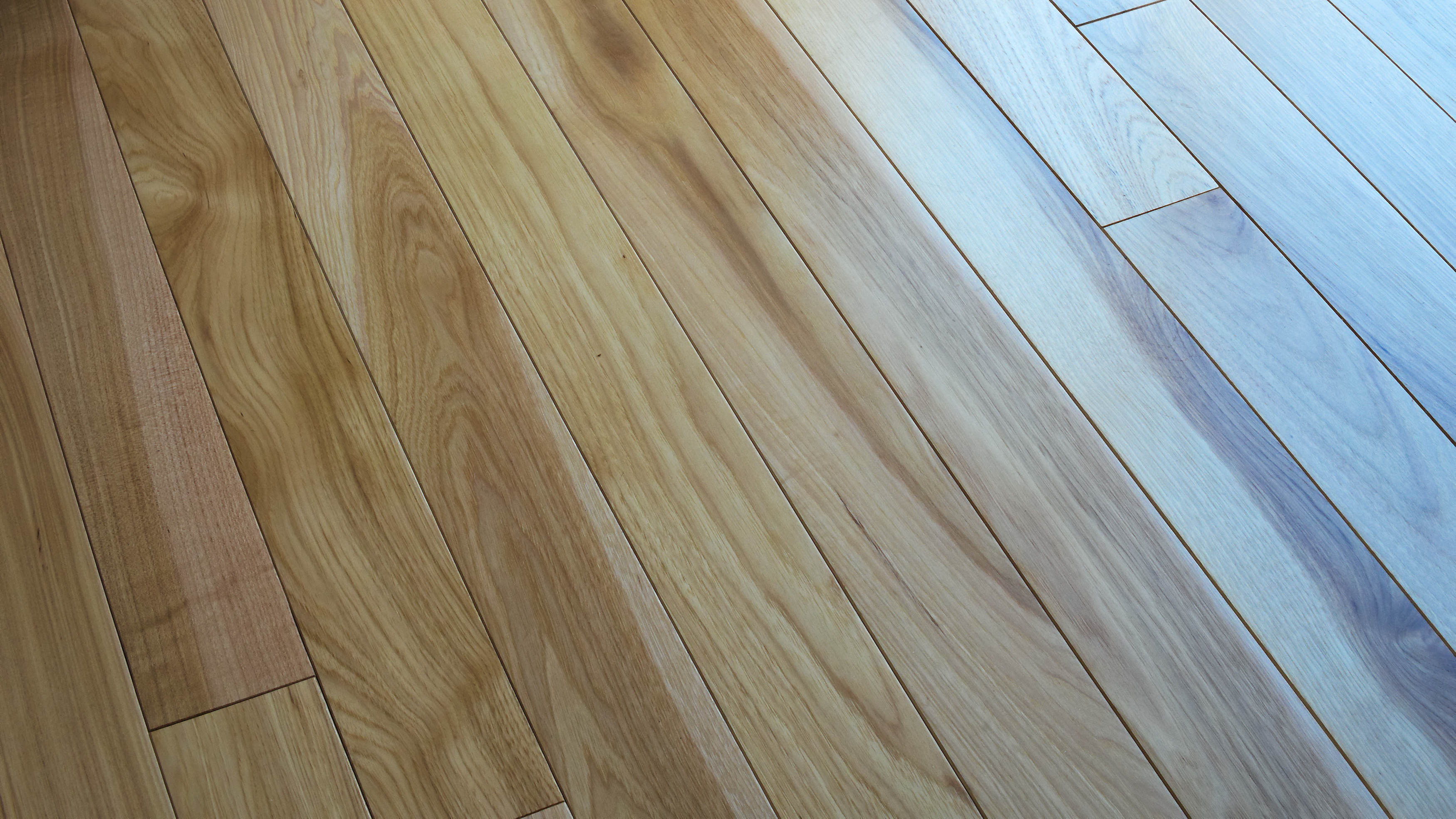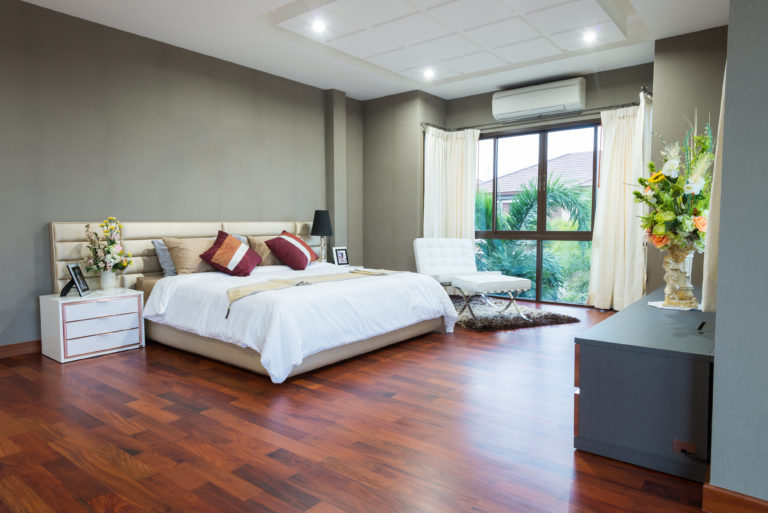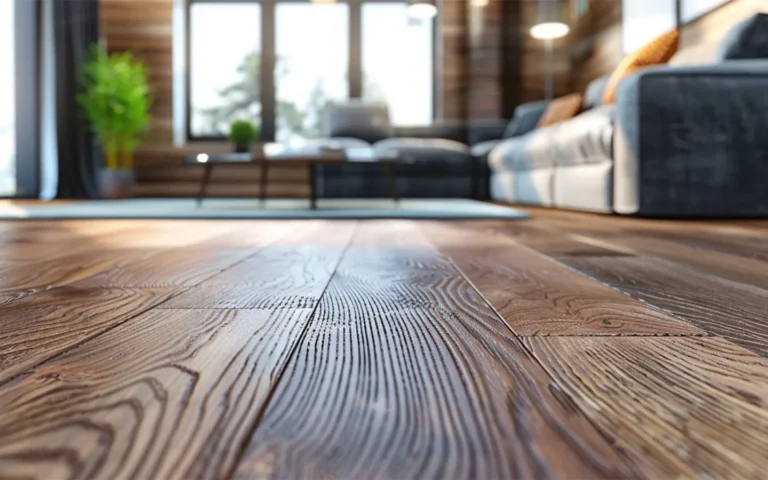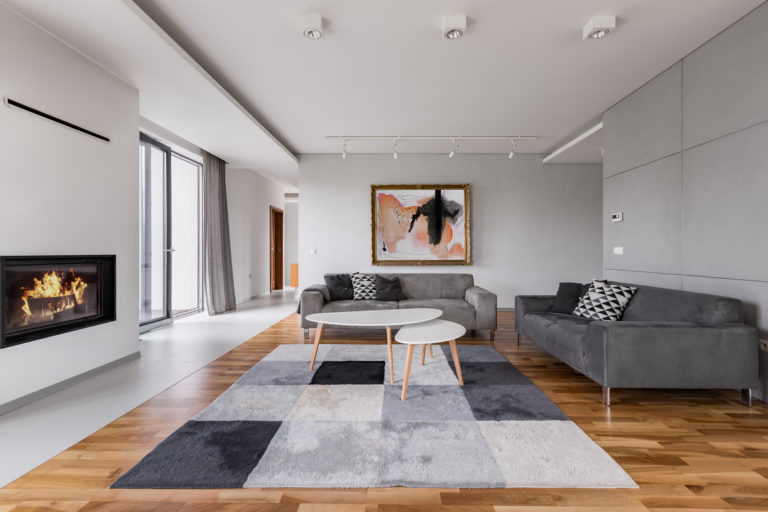This post may contain references or links to products from one or more partners of our parent company and/or subsidiaries of our parent company. For more information, visit this page.
October 22, 2020
Curious about the pros and cons of hickory flooring? It’s understandable! In our humble-ish opinion, hickory is amazing—whether you’re opting for real hickory hardwood or fake wood flooring in a hickory look.
But we know there’s not a ton of information out there about the advantages and disadvantages of hickory flooring, especially when it comes to how it compares up to other types of wood flooring.
So if you’re finding yourself stressed out, just breathe—we’re going to give you all the hickory flooring pros and cons you need to know about.
The Basics of Hickory Wood Flooring
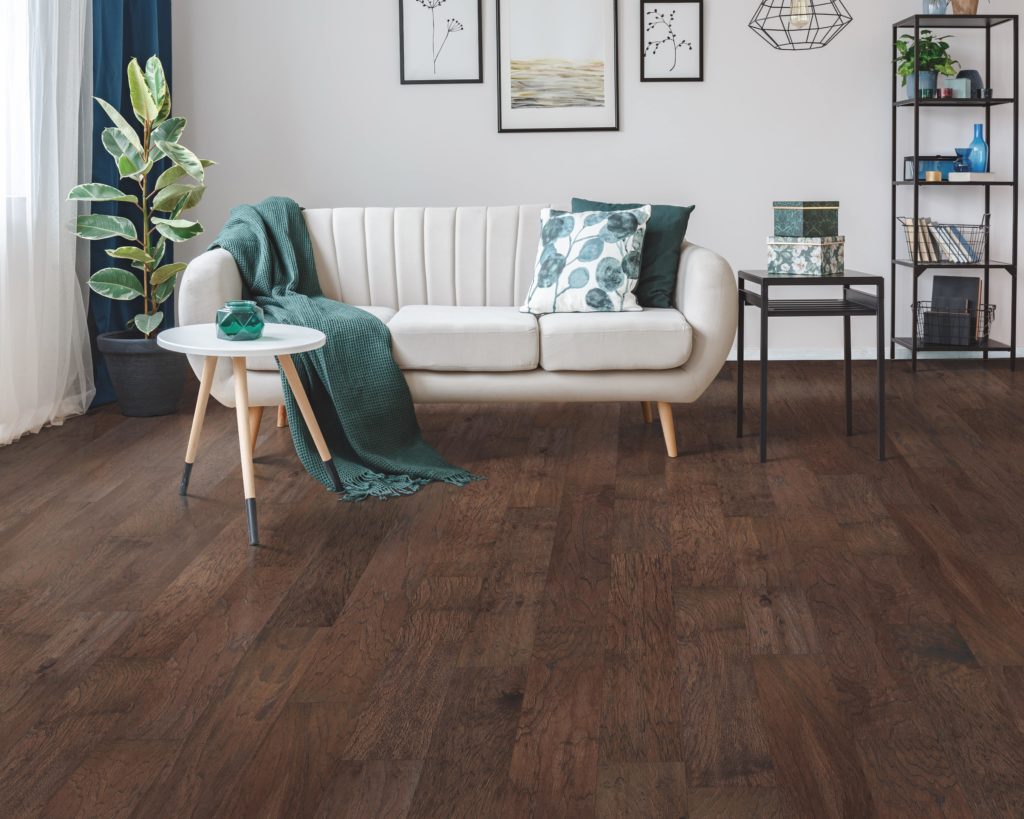
Hickory’s not among the rarest of woods, but it’s durable, gorgeous, and adds resale value to your home. Sure, there are hickory flooring cons too, but many of these “flaws” come down to personal tastes. In fact, most of the disadvantages of hickory flooring are just disadvantages of hardwood flooring in general.
Where Does Hickory Come From?
Hickory is one of the more common tree species in the United States and Europe. In fact, there are 12 species of hickory in the US and virtually all of them produce usable lumber. Moreover, some hickory trees even produce edible tree nuts like pecans!
If you’ve eaten (and adored) pecan pie, you can thank the humble hickory tree.
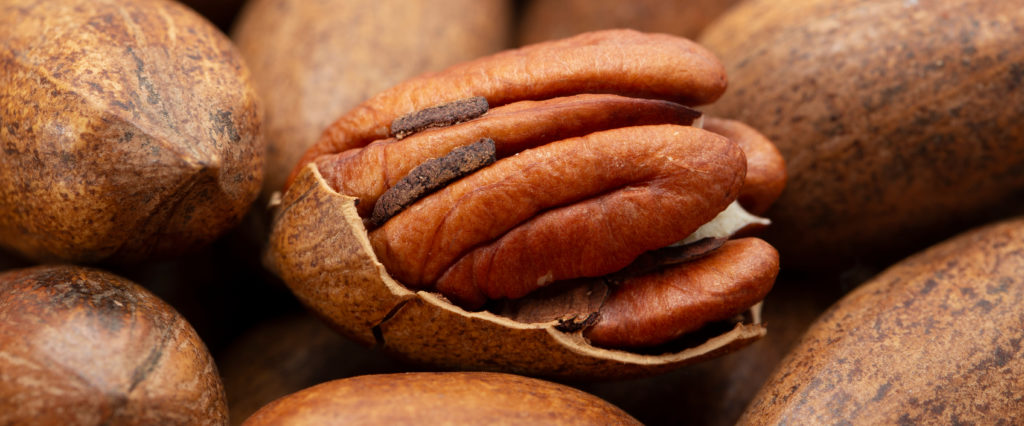
What are the Different Types of Hickory Wood?
We won’t go into too much detail here because, for the most part, the biggest differences between hickory species have very little to do with their lumber (you know, for flooring). But it might be nice to know some basics!
Hickory trees come in a variety of sizes including shellbark trees (which top out at about 60 feet) and larger shagbark trees (which are known to grow to 80–100 feet). All hickory trees produce flowers and most have droopy leaves.
However, in terms of wood grain (where it matters most), hickory wood is relatively similar from species to species. No hardcore hickory flooring pros and cons there!
Best Brands of 2024
Is Hickory Wood Good for Flooring?
The most important question when we’re talking hickory flooring pros and cons: is hickory wood good for flooring?
The answer: absolutely!
As far as domestic lumber goes, hickory is one of the most durable wood flooring choices available. It requires minimal maintenance, it’s one of the more water-resistant wood flooring options, and it has a super-unique look and charm.
Sure, hickory hardwood flooring is less common than other types of real wood flooring, and it’s fair to say that it’s not for everyone because of its rustic appearance. But that’s what stain is for!
Plus, if you’re not committed to solid hickory wood, there are loads of hardwood floor alternatives and fake wood flooring options to choose from. Seriously—you can find hickory patterns in everything from cork flooring to concrete flooring that looks like wood!
How Hard Is Hickory Flooring on the Janka Scale?
If you’re looking for scratch-resistant flooring, you’re in luck. Hickory wood scores a whopping 1820 on the Janka scale. That makes hickory more than 30% stronger than white oak, one of the most common types of flooring in the world.
Hickory Flooring Pros and Cons (Spoiler: There’s More Good than Bad)
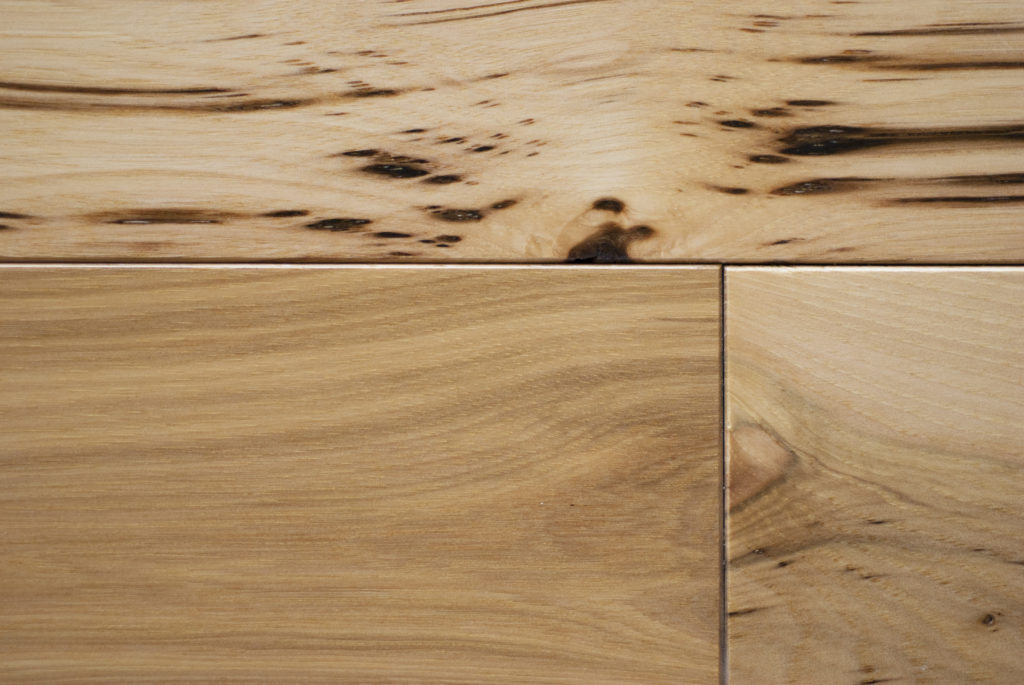
Our take on all the hickory flooring pros and cons is that there’s a lot more good than bad, but we also want to remain objective. That said, most of the disadvantages of hickory flooring really come down to its appearance, which is basically a subjective matter.
Again, Just Remember That Hickory Flooring Pros and Cons Largely Come Down to Looks
We haven’t yet talked about the oddly-shaped elephant in the room. Real hickory planks are often described as “busy” because the spirals, splotches, and waves you’d find in any type of wood are turned up to 11 here.
If you have 200 hickory planks in your home, there’s a good chance that none of them will look the same. For comparison, Douglas fir flooring falls at the other end of the crazy-grain spectrum with a straight, uniform grain.
To make up for the grain variety, most manufacturers craft wider planks of hickory than they do for other wood flooring types. This can be relatively limiting in terms of the wood floor patterns that are available for hickory (but we’ll discuss that later).
If any of this offends your senses, don’t worry—there are so many options for hickory-look faux wood flooring that you should have no problem finding your desired look.
The Advantages of Hickory Wood Flooring
Natural hickory flooring is beautiful, stainable, and oh so durable; with proper upkeep, it’ll last decades. For most people though, the draw of hickory flooring is its distinct look among domestic hardwoods.
While options like ash flooring have a fairly uniform look, natural hickory flooring is sporadic. In many ways, this gives it an old-timey look that you might find in a cabin or lodge.
Natural Hickory Flooring Lightens Rooms
We’ve already covered hickory’s noteworthy grain, but we should also mention its light, natural tones. Hickory offers a decent variety, ranging in hues from a creamy brown to an almost-golden brown.
There are also darker varieties of hickory, but they’re closer to teak flooring than they are to ebony flooring on the spectrum of wood floor colors. That said, if you look into the pros and cons of teak flooring, you’ll find that almost everyone loves the way teak looks, so again—personal preferences.
Either way, natural hickory flooring lightens rooms like crazy with its light colors and bold grain patterns. And who doesn’t want more natural light?
Hickory Hardwood Flooring Takes Stains and Finishes Super Well
If you’re still not crazy about hickory’s hues, you’re in luck because hickory is known to take stains and finishes extremely well. That means you can have all the benefits of hickory’s gorgeous grain, but in whatever hue you choose. The world is your hickory oyster!
Or, you can always opt for hickory-look faux wood flooring and skip the hassle of finishing altogether. The best types of vinyl flooring can be made to look like just about anything, including hickory.
Hickory Flooring is Harder Than Oak Flooring
This one goes firmly in the “pro” category of our hickory flooring pros and cons. Hickory is hard. Super hard. In fact, it’s roughly 30% harder than oak. And oak is the industry standard for hardwood flooring!
Hickory is Durable and Requires Very Little Maintenance
Of all the pros and cons of hickory flooring, its durability is perhaps the most impressive. Like all hardwood floors, hickory will last for decades if properly cared for. And given how hard and durable hickory is, it requires comparatively little maintenance.
Is it a contender for best wood flooring for dogs? Definitely. And while it’s still a hardwood (so it probably won’t serve well as mudroom flooring) it can do well in climates where other woods don’t.
Hickory Flooring Does Well in Climates that Are Hard on Hardwood
As far as hardwood flooring goes, hickory is comparatively resistant to water damage. This means hickory does well enough in humid climates that would ravage other types of wood flooring.
That being said: the key distinction here is that hickory does better than other types of hardwood. Should you do a wood floor bathroom with it? Debatable.
Either way, no type of authentic wood flooring will be as water or weather-resistant as a waterproof hardwood floor alternative. If you’re gearing up to floor a room that’s often wet, we’d recommend going with a specialty laminate (like Mohawk’s RevWood or RevWood Plus) or a vinyl option (check out some Pergo Extreme reviews for more info on that).
Hickory Flooring Can Increase Home Resale Values
Authentic hickory floors are generally more expensive than something like oak—meaning that they can increase your home’s resale value even more than a “normal” type of wood flooring.
But: hickory’s unique look tends to appeal to a niche audience. Not everyone loves its natural look, but those that do really love it. So, if you’re adding hickory floors for resale value, know that you might also need to appeal to a specific buyer.
Hickory Flooring Is Less Expensive than Rare or Exotic Hardwoods
Our last “pro” on our hickory flooring pros and cons list is that hickory, while uncommon itself, tends to be less expensive than import woods. Hickory is only marginally more expensive per square foot than oak flooring, on average. For a premium hardwood, it’s actually one of the cheapest options available!
The Disadvantages of Hickory Flooring
In order to be fair, we have to talk about the less-than-good stuff too. Hickory’s price tag is reasonable, but can still be pricey. It’s not the most sustainable option out there and like most solid wood floors, it’s not especially DIY-friendly either.
Is Hickory Flooring More Expensive than Oak? Yes.
One of the main disadvantages of hickory flooring vs. oak flooring: hickory’s price tag. Yes, it’s cheaper than most rare or exotic import woods like mahogany, but compared to commonly-available options like oak, the difference is plain.
Home Depot sells low-end solid hickory flooring for about $4 per square foot, which is almost a dollar more per square foot than some of their cheapest solid oak options. For a single room, that price difference may only amount to $100–$200. For a house, it could be thousands more.
Hickory is Pricier than Most Domestic Woods. Why is Hickory Wood So Expensive?
So why is hickory so expensive? The simple answer is supply. Hickory is one of the more common hardwood lumber trees in the United States, but there aren’t that many to begin with (not compared to pine, for example). In the world of lumber, a smaller supply means a heftier price tag.
The Hardness of Hickory Flooring Can Make DIY Projects Tough
Of course, hickory’s excellent hardness also makes it pretty hard to cut and shape. Simply put, if you’re looking for the easiest flooring to install by yourself, hickory isn’t it.
For DIY wood floors, a softer wood like oak may actually be a better choice—especially if you’re going to be cutting solid planks.
Of course, if you’re adamant about DIY-ing hickory floors, you could go the floating floors route. There are some disadvantages of floating floors, but they’re by far the easiest way to get DIY hickory flooring. You won’t have to ask questions like “what is subflooring?” and you’ll also save loads on contractor costs.
Hickory is Moderately Eco-Friendly (But Hickory Flooring’s Sustainability Isn’t Anything to Write Home About)
Sustainable farming practices in the United States have made hickory one of the better options in terms of hardwood flooring.
But (there’s always a but): several hickory species are flirting with endangered status. So if environmentally friendly flooring is on your mind, you may want to consider an alternative option. Hemp flooring is one choice that wins points for uniqueness, but there are loads of other eco-friendly flooring options to choose from.
Hickory’s Grain Pattern Can Be a Turn-Off
We’ve mentioned this about a thousand times now, but hickory has a super unique grain pattern. We love it. Some people don’t. And hey—that’s their loss! But when you’re considering the hickory flooring pros and cons, it’s something you should definitely consider as far as resale value is concerned.
Hickory Planks are Often Wider Than Others
As we said before, hickory planks are often cut wider than others due to hickory’s unusual grain pattern. Again, this might not be an issue—but if you like the look of thinner wood strips, it might be.
Are the Pros and Cons of Engineered Hickory Flooring the Same as They Are for Solid Hickory?
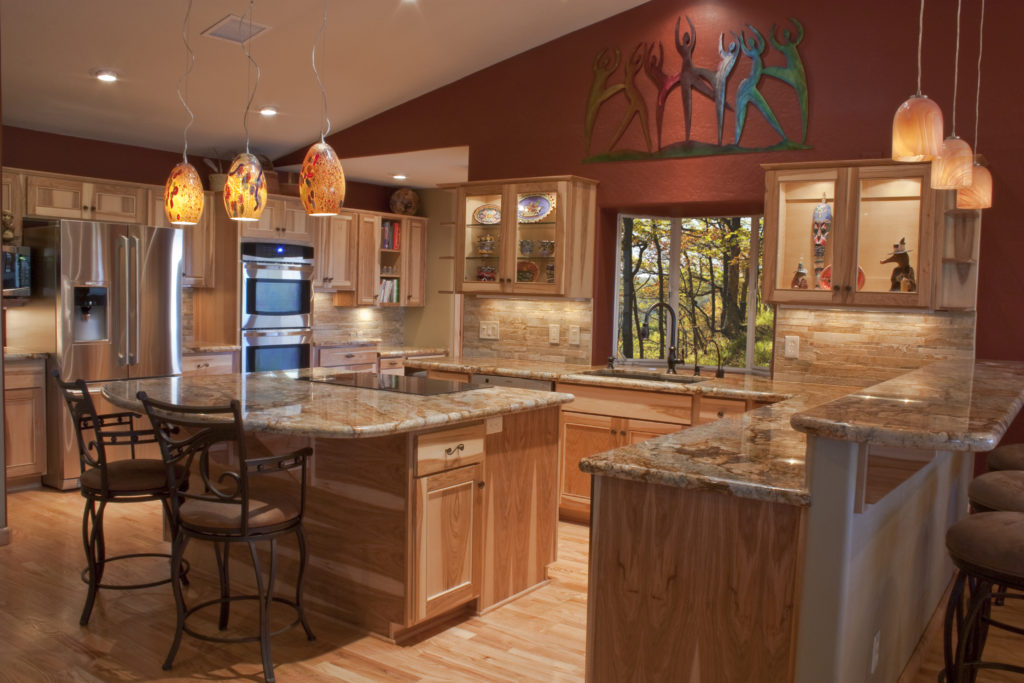
One thing that we haven’t yet explored in our hickory flooring pros and cons debate is the effect of engineered wood.
As you might already know, engineered hardwood is composed of a solid wood veneer over a plywood core. Notable engineered wood disadvantages include limited refinishing options and issues with water damage. And that’s true for engineered hickory wood as well.
On the other hand, the effort and cost to install engineered hardwood floors is generally lower. And depending on the product you choose, you can get just as much durability out of an engineered hickory floor as a solid hickory floor. Plus, all the best engineered wood flooring is more sustainable than solid because it uses less slow-growing hardwood in its construction.
At the end of the day, though, the biggest difference here is longevity. Solid hickory can be used for decades before it really needs to be replaced. The same can’t be said for engineered wood.
Translation: if you’re stressing over the cost to replace carpet with hardwood, engineered hickory might be more in your price range. If you’re looking for a super long-term investment, solid may be for you. It’s all up to your preferences!
Conclusion: Are Hickory Floors Right for You?
Are hickory floors the choice for you? If you’re thinking about using hickory flooring for a bathroom: probably not. For sunroom flooring? Maybe (engineered hickory is ideal here). For a living room or bedroom? Heck yes!
If you like natural hickory’s rustic-looking grain and large width, and you don’t mind the price, then hickory is an excellent choice! If you’re not completely sold, there are still so many other types of flooring to consider.
There are types of tile that can be made to look just like real hickory wood, and Daltile’s advances in snap-together tile flooring have made tile floors more DIY-friendly than ever.
Or, you could always go with a faux wood option—non-toxic laminate flooring is arguably the king of healthy wood alternatives. And if you’re intrigued by both tile and laminate, why not read up on the tile vs. Laminate debate?
Really, there’s no shortage of hardwood alternatives, so you’re sure to find your perfect choice!
Where to Buy Hickory Hardwood Flooring
This is the easy part! If you’ve learned everything you need about hickory flooring pros and cons (and are ready to find some hickory floors of your own), use this flooring stores near me search. Though hickory is less common than say, oak or pine, it’s still easily accessible throughout the country.
What Are the Leading Hickory Flooring Brands?
As for the make, almost all of the best hardwood floor brands offer hickory flooring. So whether you’re thinking of buying from Bruce, Armstrong, Shaw, Mohawk, or someone else, you can rest assured that there are plenty of options available.
Hickory Flooring Pros and Cons: Wrapping Up
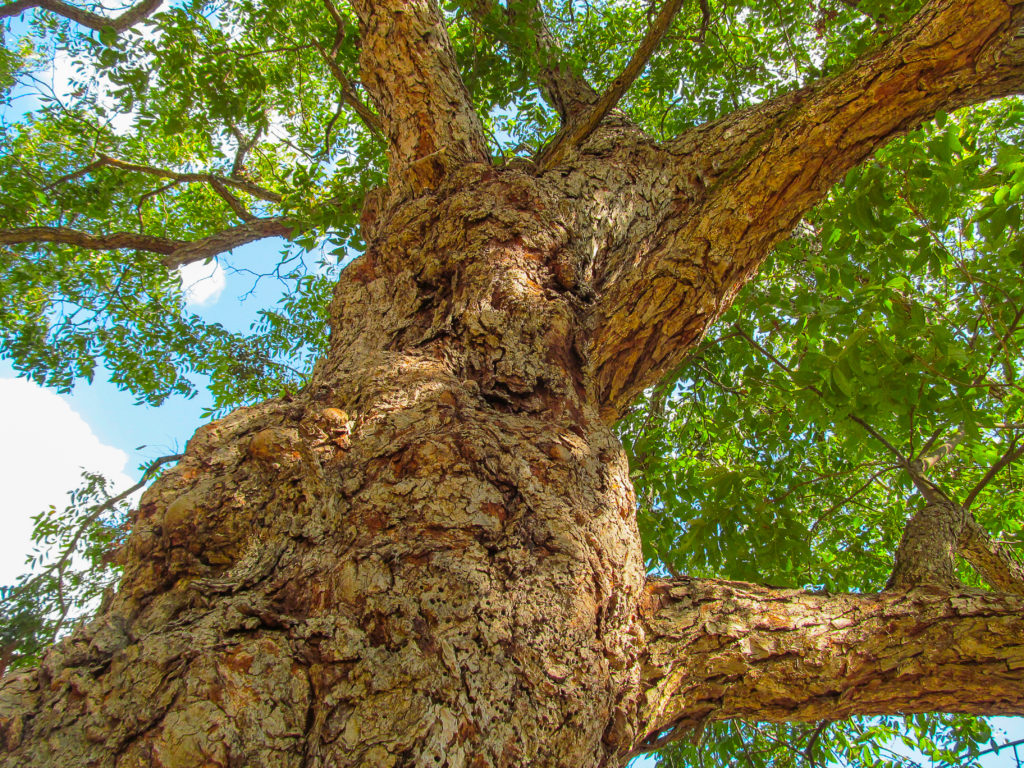
And that’s it! There are plenty of hickory flooring pros and cons, but the most important talking points come down to its unique appearance, durability, and price. And for more flooring information, check out the articles below. Happy hunting!
About The Author

Christian Southards
October 22, 2020
Christian is a freelance everything-writer, editor, and interior design nerd. When he’s not writing about flooring and remodeling, he’s either writing news for the California American Legion or working with his hands on his house. His favorite type of flooring is hardwood, but admits to having carpet in his bedroom.
